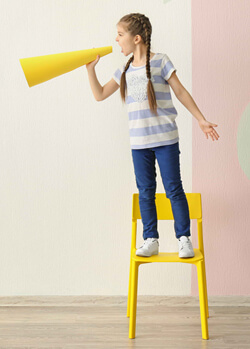Why Is It Important to Teach Your Kids
the Art of Debating?
See also: Verbal Communication
Children are naturally curious and ask countless questions about anything and everything in the world around them. Children asking questions and having healthy discussions is necessary to satisfy a child's inquisitive brain.
A debate is a general discussion about a specific topic with different parties expressing different opinions. In a discussion, the validity of the views expressed holds more importance than the speaker's charisma. From improving listening and speaking skills to building self-esteem, learning to the debate can have many benefits for your child. It also sharpens critical listening skills and the child's ability to interact with others confidently.
The art of debate is a valuable skill that every child should develop. Debating teaches children to analyze, rationalize, put forward comprehensive arguments, and disagree politely. Moreover, it helps children improve their academic performance and scores as they learn to research, prioritize and write evidence-based arguments.
Some debates require children to share their personal opinions, which requires little preparation when compared to other fact-based topics. Kids' debate topics can be simple, tough, or range from the ordinary to complex and intense. Debates instill a sense of perspective and also help to build self-esteem. It's a matter of pride for children to be asked for their opinion and show them that their thoughts and voices matter.

Here are a few of the critical benefits of teaching the art of debating to children:
Improves critical thinking skills:
Debating helps children develop essential, necessary thinking skills, which allows them to reason and think through arguments. It also creates the ability to question the evidence behind a particular statement or stance rationally. When children learn debating, it helps them order their words and thoughts in a structured way to prove their argument. They must learn to prioritize the essential points and be prepared for the counter argument to those points. Children learn to remember and grasp knowledge more quickly when they learn the skills to debate. Debates provide experiences that are conducive to life-changing cognitive skills.
Aids self-expression:
Debating is a skill that teaches you how best to formulate arguments, to do research and be well prepared, and to verbalize your thoughts firmly and persuasively. Cultivating debating skills in children develop their ability to express their opinions and views clearly in public confidently. It boosts the courage to use focused and confident expression words, helping the child in public speaking. Debates fuel freedom of thought and pride while sharing opinions.
Is the secret to confident challenging speaking:
Interpersonal and communication skills in a public setting are as crucial as other life skills. Developing these skills will help children in the long run, especially in their careers. Once children start actively participating in society, they begin to have personal views on most things. When this happens, children have a desire to voice their opinion and share their ideas. Public speaking helps them stand up and proudly share their opinion. Communication is often not just the words spoken to express thoughts; delivery, emotions, and body language also matter. Debates enable children to overcome public speaking fears and help them to learn voice modulation and reasoning. It is best to encourage children to participate in interactive discussions and small group discussions to sharpen their debating skills gradually.
Helps gain knowledge across several disciplines:
Debating is not limited to just having views on political or social topics; it helps participants to broaden their horizons and acquire a different view on the world. Debating helps gain broad, multi-faceted knowledge that cuts across several disciplines outside the learner's academic subjects. Debating leads children to study topics deeply to understand them from multiple perspectives. An exposed viewpoint will encourage students to be the pride of their skills and achievements.
Boosts presentation skills:
Presentation plays an integral part in how others perceive you as an individual; how you speak and present your views. Cultivating presentation skills will earn kids instant respect, both while debating and further during different situations. Having poise and precise speech delivery during debates indicates that the child has excellent public speaking skills.
Bonus: A few debate topic ideas to help kids get started
Before choosing a topic, it is essential to consider the genre and your kid's age and ability. Children need to research various topics, practice well for their argument and have a perspective from multiple viewpoints. From internal school debates to competitive debate competitions, children have to follow a debate format. Here are some exciting debate topics which you can choose for your kids to practice their debating skills:
- Should homework be banned, or do assignments promote learning?
- Banning mobile devices (cell phones, smartphones) at schools: yes or no?
- Is it appropriate to allow students to create their curriculum?
- Should celebrities be required to be positive role models?
- Should people be fined for not recycling?
- Should schools punish cyberbullying that occurs outside of school?
- Should teachers not be allowed to contact students through social media?
- Should public prayer be allowed in schools?
- Should mobile phones be banned in school?
- Is vegetarian food better than non-vegetarian food?
Debate helps build the 'Four Cs' of 21st-century skills that a person can leverage to succeed in life. These four core ones are critical thinking, communication, collaboration, and creativity. Classroom debates can nurture rational thinking, citizenship, manners, organization of thoughts, persuasion, and public speaking. Such competitions serve to mold a child's opinion and views about different subjects from different perspectives, making them successful and professionally equipped to face the world outside.
Further Reading from Skills You Need
Our Communication Skills eBooks
Learn more about the key communication skills you need to be a more effective communicator.
Our eBooks are ideal for anyone who wants to learn about or develop their interpersonal skills and are full of easy-to-follow, practical information.
About the Author

Samidha Raj works as part of the content marketing team at Planet Spark, a platform that provides online classes to K8 learners on "new age skills" like, English communication, public speaking, grammar, creative writing, debating, etc. She is passionate about empowering the youth by educating parents about the importance of 21st-century skills. In her free time, you can find her watching documentaries or animated movies and organizing game nights (board games are her thing)!

